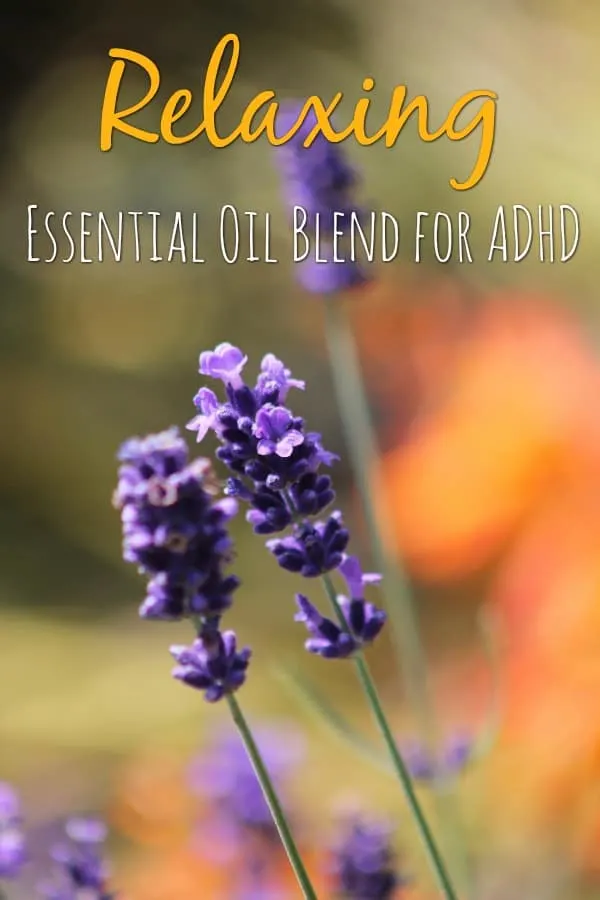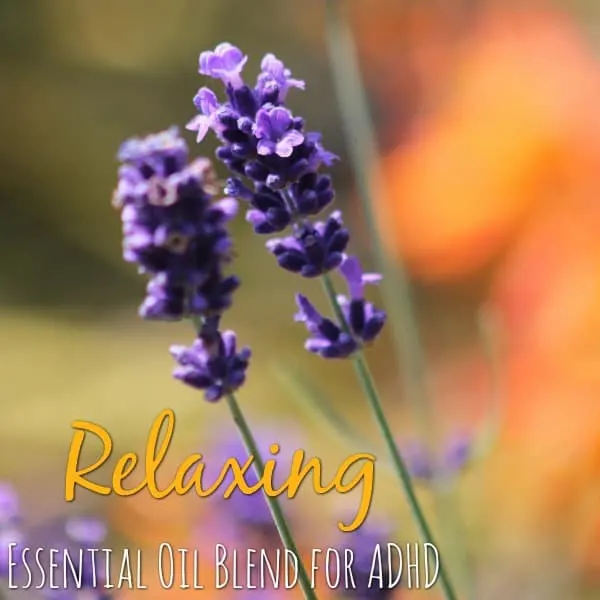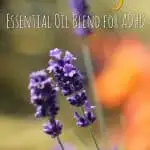* This statement has not been evaluated by the Food and Drug Administration. This product is not intended to diagnose, treat, cure, or prevent any disease.
There is some evidence that suggests that diffusing essential oils can help children and adults with ADHD. Even if your child already takes medication, an ADHD essential oil blend diffuser recipe may help eliminate stress during homework sessions or bedtime.
While you’re learning about this, be sure to read my Recipes Using Essential Oils for more great tips and information.

If you have noticed any of the symptoms of ADHD in your children (or maybe even yourself!), or have recently received a diagnosis of ADHD in one of your kiddos, you may be wondering how to proceed.
Attention Deficit Hyperactivity Disorder, commonly known as ADHD, is a neurodevelopmental disorder that affects both children and adults. It is characterized by persistent patterns of inattention, impulsivity, or hyperactivity that are more frequent and severe than typically observed in individuals at a comparable level of development.
These symptoms can significantly impact various aspects of a person’s life, including academic performance, work productivity, and social relationships.
In the search for effective management strategies, many people with ADHD have turned to natural remedies, such as essential oils. These aromatic compounds, extracted from plants, have been used for centuries in traditional medicine and aromatherapy due to their therapeutic properties. For individuals with ADHD, specific essential oils may help manage symptoms by promoting relaxation, improving focus, reducing anxiety, and enhancing mood.
It’s important to note that while essential oils can be a beneficial adjunctive therapy, they are not a cure for ADHD. They should be used in conjunction with, not as a replacement for, traditional ADHD treatments prescribed by a healthcare professional
Understanding Essential Oils
Essential oils are concentrated plant extracts that capture the natural scent and flavor, or “essence,” of their source. These oils are typically obtained through two processes: distillation (via steam and/or water) or mechanical methods such as cold pressing. After extraction, the resulting product is combined with a carrier oil to create a product ready for use.
The therapeutic properties of essential oils come from their unique chemical compositions. Each plant species produces different types and amounts of these chemicals, which can have various effects on the body and mind. For example, some oils might promote relaxation, while others could help boost focus or mood.
Essential oils interact with the body in several ways. When applied topically, they can be absorbed through the skin and enter the bloodstream. Alternatively, when inhaled, the aromatic molecules can interact with the olfactory system, which communicates directly with the brain.
This interaction can trigger various physiological responses, such as changes in heart rate, blood pressure, breathing, and immune function, as well as psychological responses like feelings of calmness or alertness.
Essential Oils and ADHD
Several essential oils have been found to help manage symptoms of Attention-Deficit/Hyperactivity Disorder (ADHD). For instance:
- Lavender Essential Oil (Lavandula angustifolia): Known for its calming properties, lavender oil can help reduce anxiety and promote better sleep, which can be beneficial for those with ADHD.
- Vetiver Oil (Vetiveria zizanioides): This oil has been studied for its potential to improve focus and reduce hyperactivity in children with ADHD.
- Frankincense Oil (Boswellia serrata): Sometimes used in meditation practices, frankincense can promote feelings of relaxation and mental clarity.
- Cedarwood Oil (Cedrus atlantica): This oil has a grounding effect and may help individuals with ADHD feel more centered and focused.
- Ylang ylang Oil (Cananga odorata): Is used to stabilize emotions
- Mandarin (Citrus reticulata): Designed to calm and quiet the mind- any citrus oils will have a similar effect
- Roman chamomile (Chamaemelum nobile): Promotes a feeling of calm and relaxation
- Peppermint (Mentha piperita): In a case study, diffusing peppermint oil improved working memory in study participants
- Patchouli (Pogostemom cablin): Often added to calm the nerves
- Cinnamon (Cinnamon zeylanicum): (This case study found diffusing small amounts of cinnamon oil into the air boosted test performance)
While there are hundreds of essential oil blends you can diffuse, I find that the simplest blends are often the easiest to use.
Not all blends will work the same way for everyone, so after trying my recipe, try adding a few of the other ingredients listed to create the perfect ADHD essential oil blend recipe for your specific needs.
It’s important to remember that while essential oils can be a helpful tool in managing ADHD symptoms, they are not a standalone treatment.
They should be used as a complementary therapy alongside other prescribed treatments and under the guidance of a healthcare professional.
Furthermore, essential oils should always be used safely — they should be diluted before topical application, and not all oils are safe to ingest or use around children or pets.
Essential Oils and the Nervous System
The nervous system, which includes the brain, spinal cord, and a vast network of nerves, is a complex system that regulates bodily functions. Essential oils can impact this system in various ways.
Modulating Physiological Responses
Essential oils can produce a range of pharmacological responses. For instance, they can have anxiolytic (anxiety-reducing) and antidepressant effects, possibly associated with suppressing the activity of the sympathetic nervous system, the part of the nervous system that prepares the body for “fight or flight” responses.
Influencing Stress Hormones
Certain essential oils, such as lavender, have been shown to reduce levels of cortisol, the stress hormone. This can potentially help manage stress-related disorders and improve overall wellbeing.
Essential Oils and the Immune System
Our immune system, the body’s defense mechanism against disease-causing microorganisms, can also be influenced by essential oils.
Boosting Immune Functions
Some essential oils, like lavender, can boost markers of immune function. They can decrease inflammation a common immune response, and enhance the activity of certain types of immune cells.
Regulating and Activating Body Systems
Essential oils have been used to regulate and activate various body systems, including the immune system. They can help boost the immune system, enhancing its ability to fight off pathogens and disease.
Benefits of Using Essential Oils for ADHD
The use of various essential oils for managing ADHD symptoms can offer several benefits to alternative therapies :
- Improved Focus and Concentration: Certain essential oils, such as vetiver and cedarwood, are known for their grounding effects. They can help enhance focus and concentration, which can be particularly beneficial for those dealing with the inattentiveness often associated with ADHD.
- Decreased Anxiety: Many individuals with ADHD also experience heightened levels of anxiety. Essential oils like lavender have a calming effect that can help reduce feelings of stress and anxiety.
- Better Sleep: Sleep problems are common among people with ADHD. Essential oils such as lavender and chamomile are renowned for their soothing and sedative properties, which can promote better sleep quality.
- Balanced Mood: Essential oils like frankincense and bergamot are both a great option to help balance mood by promoting relaxation and reducing feelings of irritability or restlessness. This can be especially helpful as mood swings are a common issue for those with ADHD.
- Natural and Non-Invasive: Essential oils provide a natural and non-invasive way to manage ADHD symptoms. They can be diffused into the air, applied topically (with proper dilution), or used in other easy ways as part of a daily routine.
- Complementary Therapy: While not a standalone treatment for ADHD, essential oils can complement other therapeutic strategies, such as medication, behavioral therapy, diet, and exercise.
Remember, it’s crucial to consult with a healthcare provider before starting any new treatment regimen, including the use of essential oils.
Everyone is unique, and what works well for one person may not work as well for another.
It’s also important to source high-quality essential oils and use them safely according to the manufacturer’s instructions.
Safety Precautions for Using Essential Oils
While essential oils can be beneficial for managing ADHD symptoms, it’s crucial to use them safely.
Here are some important safety precautions to keep in mind when considering taking advantage of the amazing natural benefits of essential oils:
- Dilution: Essential oils are highly concentrated and can cause skin irritation or sensitivity if applied directly. Always dilute them with a carrier oil, such as coconut or jojoba oil, before topical application. A common guideline is to use one to two drops of essential oil per teaspoon of carrier oil.
- Children’s Safety: Children have more sensitive skin than adults, so the essential oil concentration needs to be even lower. Some oils may not be suitable for children at all. Always consult with a healthcare provider or an experienced aromatherapist before using essential oils on or around children.
- Ingestion: Not all essential oils are safe to ingest. While some oils are used for flavoring in food and drinks, many are not safe for internal use. Always seek professional advice before ingesting any essential oil.
- Avoid Certain Oils: Some essential oils should be avoided under certain conditions. For example, pregnant women, breastfeeding mothers, and people with specific health conditions or allergies may need to avoid certain oils. It’s always best to consult with a healthcare provider first.
- Quality Matters: Not all essential oils are created equal. Some may contain additives or synthetic ingredients. Always choose high-quality, 100% pure essential oils from reputable suppliers for the best results.
Remember, while essential oils can offer therapeutic benefits, even the best essential oils are not a substitute for professional medical advice or treatment. Always consult with a healthcare provider for personalized advice.
ADHD and Essential Oils: Potential Unwanted Side Effects
Essential oils have gained popularity for their potential benefits in managing ADHD and Autism Spectrum Disorder symptoms.
However, it’s crucial to understand that while they can be beneficial, essential oils can also have harmful side effects, especially if used incorrectly or excessively.
Side Effects of Essential Oils
Most common side effects of essential oils include headaches and nausea. These reactions usually occur when the oils are used excessively or improperly.
In some cases, essential oils may cause skin irritation or allergic reactions, especially when applied directly to the skin without a carrier oil.
Special Considerations for Children
Children, particularly those with ADHD, may have sensitivity traits that make them more susceptible to side effects.
For instance, rosemary and peppermint oils should be used cautiously among individuals with ADHD due to potential sensitivity traits. It’s important to note that not all essential oils are suitable for children.
ADHD Blend Ingredients:
Mix together and store in an amber bottle:
This can be diffused 3-4 drops at a time with a diffuser, but if you want to use it topically, make the following additions:
ADHD Essential Oil Diffuser Blend Recipe for Hyperactivity
Children with ADHD are often hyperactive at bedtime, and diffusing this essential oil blend promotes a feeling of calm and peace. I like to use this blend to calm everyone down at night before bed.
This ADHD essential oil blend recipe is designed to encourage relaxation and reduce hyperactivity.
This blend can be used topically when rubbed into the skin with a carrier oil (we like fractionated coconut oil) or diffused into the room with a diffuser (this is my favorite).
This ADHD essential oil blend recipe is designed to help with relaxation and focus by eliminating anxiety, stress, and distractions.
Materials
- 20 drops Lavender
- 20 drops Roman chamomile
- 10 drops Vetiver
- 10 drops Ylang ylang
- 20 drops Mandarin
- 12 teaspoons of fractionated coconut oi
Tools
- amber bottle
Instructions
Diffuser: Mix together the first 5 ingredients and store in an amber bottle
Topical Roll On: After mixing the oils, drop 20 drops into 12 teaspoons of fractionated coconut oil. Mix well and store in an amber roll-on bottle.
Notes
This can be diffused 3-4 drops at a time with a diffuser, but if you want to use it topically, make the following additions:
- After mixing the oils, drop 20 drops into 12 teaspoons of fractionated coconut oil. Mix well and store in an amber roll-on bottle.
- This mixture should be safe for most young children over age two. Check this dilution chart to determine if you should make your mixture stronger or weaker.
If you’d rather not deal with making your own ADHD essential oil blend recipe or are on a tight budget, we love this pre-made blend for ADHD from Rocky Mountain oils.


